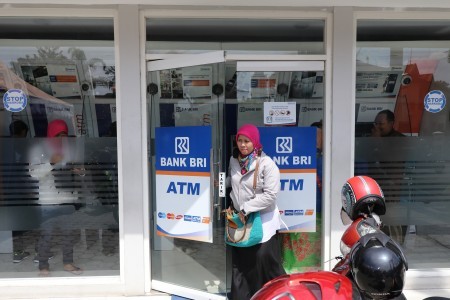Popular Reads
Top Results
Can't find what you're looking for?
View all search resultsPopular Reads
Top Results
Can't find what you're looking for?
View all search resultsBRI braces for further COVID-19 impacts on financial performance
The pandemic has impacted the bank’s quarterly figures, as its profit dropped slightly to Rp 8.17 trillion (US$550 million) in the first three months of this year, from Rp 8.2 trillion in the same period last year.
Change text size
Gift Premium Articles
to Anyone
S
tate-owned lender Bank Rakyat Indonesia (BRI) has lowered its expectations for its financial performance this year amid the unfavorable market conditions due to the COVID-19 pandemic and the government’s loan-restructuring program.
The pandemic has impacted the bank’s quarterly figures, as its profit dropped slightly to Rp 8.17 trillion (US$550 million) in the first three months of this year, from Rp 8.2 trillion in the same period last year.
BRI finance director Haru Koesmahargyo attributed the decline to unfavorable market conditions that had affected the performance of its subsidiaries, such as insurance firm BRI Life and agriculture-focused lender BRI Agro.
“We are definitely revising our bank business plan this year [given the situation],” Haru said during a virtual press conference on Thursday.
For example, the bank expects to slash its loan growth target to 5 percent this year from its initial target of 11 percent, according to presentation material obtained by The Jakarta Post. The figure is far lower than last year’s loan growth of 8.4 percent.
Despite the slight drop in profit, the bank still recorded 9.4 percent year-on-year (yoy) growth in loan disbursement during the first quarter to Rp 882.25 trillion.
The figure is higher than the average industry growth of 7.95 percent during the same period, according to BRI president director Sunarso.
“The growth in loan disbursement in the first quarter was mainly driven by the micro and medium retail segments,” Sunarso said during the same event.
Loan disbursement for the micro segment grew 12.72 percent yoy during the period, while loan disbursement to the retail and medium segment increased 12.25 percent yoy.
Meanwhile, Sunarso also expected the loan restructuring program that allows debtors, especially micro, small and medium business players impacted by the pandemic, to defer principal and interest payments to banks, would further affect BRI’s performance this year.
“The restructuring [program] will impact our business on two fronts, namely liquidity and revenue,” he said. “Delaying loan principal payments will impact liquidity while delaying interest will impact our revenue.”
The bank has restructured loans of 1.4 million micro, small and medium enterprises (MSMEs) totaling Rp 101 trillion as of April, according to Sunarso.
Given the situation, the bank expressed hope that the government’s plan to place funds in banks could help relieve its liquidity problems this year.
The government recently issued Government Regulation (PP) No. 23/2020 on the national economic recovery program, stipulating that it will carry out efforts to support the recovery of the virus-battered economy. The measures include the placement of funds in certain domestic banks to provide more liquidity.
According to Finance Ministry presentation material obtained by The Jakarta Post, the government might allocate Rp 35 trillion for this purpose.
For the time being, Sunarso said the bank still had ample liquidity despite the turbulent economic conditions.
BRI’s capital adequacy ratio currently clocked in at 18.56 percent as of March, while its loan-to-deposit ratio stood at 90.45 percent, below the minimum requirement of 92 percent.
Mirae Asset Sekuritas analyst Lee Young Jun also expects the restructuring efforts to affect the bank’s net interest margin (NIM).
“We believe that additional restructured loans will likely drag NIM down going forward,” he said in a research note on Friday, adding that it expected BRI’s NIM to decline by 78 basis points this year from 2019’s 6.98 percent.
BRI’s NIM stood at 6.66 percent in the first quarter of this year, slightly lower than 6.89 percent figure recorded in the same period last year.










